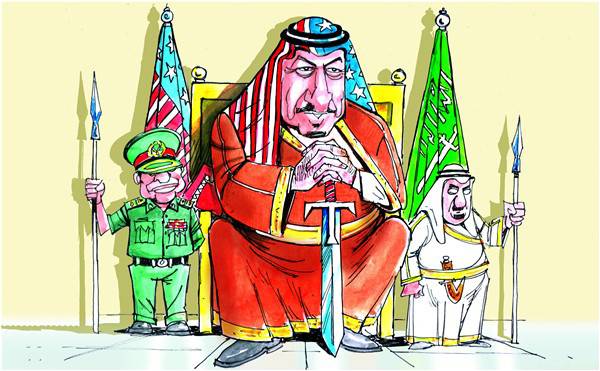
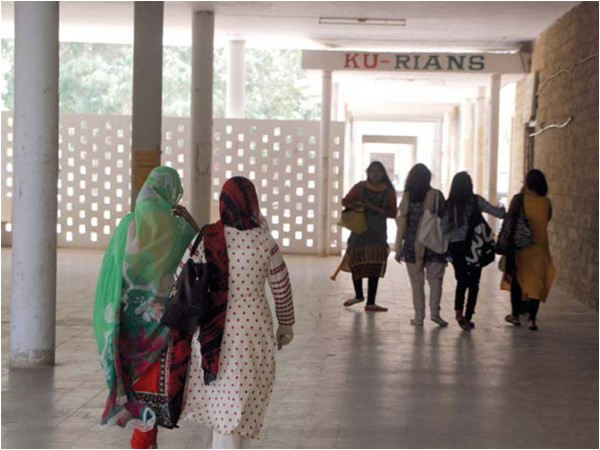
Inside Karachi university
Sir,
My name is Hiba Zahid and I am a student of Karachi university, which is one of the well-known government institutions in Pakistan and among the top 250 in Asia. But what if I asked you if you really knew what was happening there? I hope that the administration will try to help solve these problems:
Problem No. 1: First of all I would like to talk about drugs and smoking in KU. Recently, a notification strictly prohibited smoking, gutka, pan, and chhalia (betel nut). But the rule is not being followed. The number of students breaking this rule is increasing day by day.
Problem No. 2: There are hundreds of students studying in different departments at KU, a majority of which have to reach campus through the university points. The number of points allotted by the university are not enough for the number of students.
Problem No. 3: In the Mass Communication department, students are depressed because of the assignment to write and have published at least five letters to the editor in any of the English language newspapers. If you fail to do this, they will deduct 10 marks in the exam. I request the university professors to think about the issue seriously and not give such assignments. It is not in the hands of students to force newspapers to publish their letters.
Problem No. 4: A major problem is “favoritism”. Students have been told to respect all teaching and non-teaching staff, and cooperate with security staff to ensure discipline——but what if I asked you about respect for students? Sometimes teachers interrupt one student giving an answer and move to another because they are a favourite. A lucky few students, who look “cute”, are smart and well-behaved or are accustomed to giving big smiles win. For the others, though, it is a half-hearted greeting and barely a glance.
Problem No. 5: There are no outdoor games for girls.
Problem No. 6: Students are involved in politics more than their studies.
Problem No. 7: I am an evening batch student and I have a lot of difficulty getting from one class to another because there aren’t enough streetlights. Many of them are not switched on.
I request the KU authorities to look into the matter.
Hiba Zahid,
Karachi.
(Note from news editor: Dear Hiba, we are happy to publish letters to the editor in The Friday Times, provided they shed light on some topic, are factually accurate and move the debate on an issue forward.)

Marital rape
Sir,
Marital rape is a problem in our society but because of tradition and a sense of taboo people rarely discuss it. But if they look elsewhere in the world they will see that it is very much recognised as a phenomenon. It has been defined as any unwanted sexual act by a spouse or ex-spouse that is committed without the other person’s consent. Such illegal activity are done using force, threat of force, intimidation, or when a person is unable to consent. In Pakistan, though many people do not even consider it rape because they say how can you say that if you are in the nikkah of a man, how can he be a rapist? These people seem to forget that this binding contract does not give men a free licence to abuse. They actually fail to understand that it is a sacred relationship.
Marital rape is not restricted to any particular age either. We just don’t hear women talking about it.
NGO who work on women’s issues say that they are reluctant to go to court on these issues. And so, it appears that legally and socially there is no support for women who suffer this crime.
Faryal Yaqoob Mughal,
Karachi.
FAST test
Sir,
On June 7, 2017, Fast Islamabad initiated a recruiting session for the position of “Manager Academics”. This session included a computer-based test that consisted 100 multiple choice questions, and a handwritten essay of 400-600 words. For this particular position there were almost 50 candidates if not slightly more.
Everything seemed normal till I saw the questions. I simply could not believe my eyes. I checked and rechecked a few times on the top page of the test to make sure whether the test was for some position other than “manager academics”. The entire test revolved around questions on MS Excel, MS Word, word-meanings, synonyms, antonyms, punctuation and the like.
As multiple choices, the questions related to the different commands in Excel and Word documents. Other questions pertained to: Modifiers, synonyms and antonyms, correcting grammatical errors, punctuation and vocabulary.
And that was it. After going through the ordeal, I got a page from the invigilator where I had to choose from two given topics. Looking at the topics was a second shock. The topics had nothing to do with the portfolio of “manager academics”. One of them was: “Nature as I see it…”
After submitting the essay, the candidates were told to wait in the auditorium where the result of the computer test would be displayed. They announced that anyone who did not qualify the computer test would not proceed further for the interview. So those candidates that did not qualify were asked to leave. But then this was not the complete result. The result of the essay was still undelivered. And I wondered what was the point of a handwritten essay test then?
It is sad that a prominent academic institution would conduct such an irrelevant hiring session. From this emerge a number of possibilities, such as: The entire interview/test session was a hoax, and that they had already filled the position; The people managing the session had no knowledge about the basic elements necessary for the position of manager academics; They have no idea about the relevant qualifications, experience, designing the interview or test.
Where is the Higher Education Commission of Pakistan? What exactly is its role? How can it monitor such discrepancies and resolve issues quickly, rather than allowing then to set in bureaucratically? Where is accountability, ownership and responsibility of those involved in the administrative/management and education processes?
There is no country that has economically succeeded without the true enhancement of education. There are hundreds of international reports that inform us about the state of education in Pakistan. When I read these reports they fully reflect the reality. I am saying this because I work in an academic setting.
With regards to “voice and accountability” and “regulatory quality” in education, Pakistan stands at “significantly worsened” category (Hallak & Poisson, 2007). With regards to malpractices prior to the examination, students are granted access to some part of the exam papers (Ibid). By 2015 the number of illiterate adults in Pakistan increased to 51 million, 2/3rds are women and this is the 3rd largest globally (UNESCO, 2013/4). The HEC website lists blacklisted institutions, academic programs and some faculty members. The latest example is of Imperial College Lahore. Back in the day, Imperial College was one of the best institutes in Lahore. Such is the scale and the intensity of the crisis in education in Pakistan. It is my request to the HEC to devise strategies offer solutions.
Amer Bhaur,
Via email.
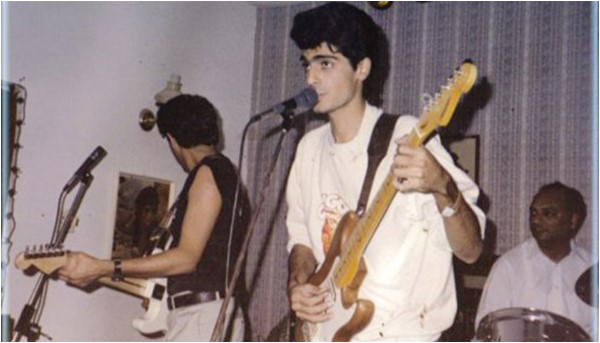
RIP Aamir Zaki
Sir,
It is sad to mention that one of the Pakistan’s top guitar virtuosos, Aamir Zaki, left this cruel world at the age of 49 due to heart failure. According to a report, he had been playing guitar since the age of 14. Zaki was best known for a short stint with the Vital Signs in 1994. He also played with the band on their fourth album before being asked to leave. Another report disclosed that he was a great teacher as well, who inspired so many people. He inspired them to just pick up an instrument and play, and when someone like him goes away, that kind of teacher is lost.
His death is a loss for the music industry but more than that for people in general, because he was one of a kind. He is someone who will be missed but celebrated. I pray that Allah the Almighty rests his soul in peace.
Muhammad Bakhtiyar,
Turbat, Kech.

Stock market tax
Sir,
We saw an unprecedented panic selling frenzy in the Pakistan Stock Exchange during the trading week that ended on June 2 when the market lost 4,000 points and value worth Rs650 billion. This stock market bloodbath took place during the week following the announcement of budget 2017-18 by Ishaq Dar who is generally known as a moderate and market-friendly finance minister. The stock market was expecting some positive news from the budget such as a removal of the tax on bonus shares but contrary to this, the finance minister shocked it by enhancing the tax on dividend income and capital gains.
The enhanced taxes on dividend income and capital gains would bring around Rs7 billion to the national kitty from the stock market in the financial year 2017-18 but the market cap worth of Rs650 billion was wiped out in just a week. Small investors have been burned.
The PML-N government has been claiming that the stock market surge during the last four years happened because of their good economic policies. So why is the PML-N destroying these gains by imposing unnecessary taxes on the stock market? I think the finance minister has been ill advised. Enhanced taxes on the stock market have scared away foreign investors who were expected to invest around $300 million to $400 million starting June 1 when the index was upgraded to the MSCI emerging market index.
The enhanced withholding tax on dividend income is inappropriate because it means taking out money of the pockets of a good number of small investors, who reportedly after a reduction in the interest on national saving centres, have diverted their savings to the stock market hoping to get a better return in the form of a dividend on their shareholdings. I suggest the respectable finance minister review and withdraw the enhanced tax on the stock market imposed in budget 2017-18 in order to save it from unnecessary shocks. I believe that Pakistan’s economic fundamentals are good and its stock market has yet to realise to it’s rightful place in the world.
Ejaz Ahmad Magoon (FCA),
Lahore.
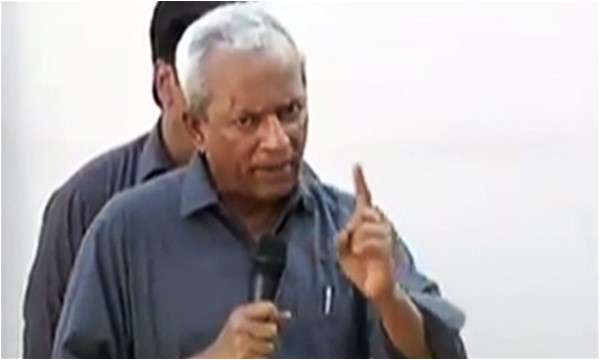
Nehal Hashmi
Sir,
Nehal Hashmi (was) a senator of the PML(N). He publically announced that nobody could investigate the prime minister and his children and those who were doing this should worry about their future. In democratic countries, this would be considered the worst type of attack on governmental institutions. How is it possible for the officers to investigate the culprits in such circumstances? It is a matter of pleasure that the Chief Justice of the Supreme Court took action on this outburst.
Manazir Hayat Ranjha,
Kot Momin.
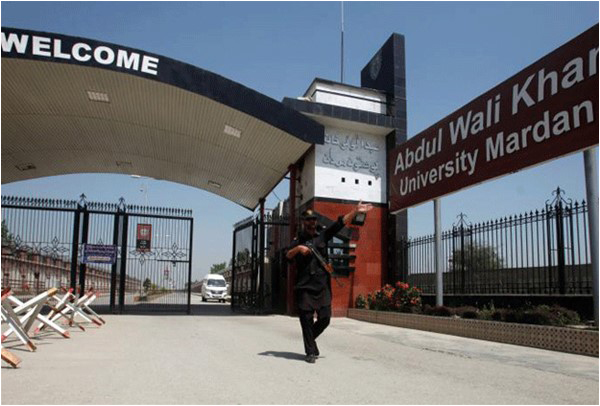
Mashal Khan
Sir,
A Joint Investigation Team (JIT) of 13 members has prepared a report on Mashal Khan’s lynching. According to it, Mashal was proven innocent and the charge of blasphemy on him was baseless as the JIT did not find a single piece of evidence in this regard. The report states that Mashal’s murder was planned and that the university management was involved in inciting students. The police did not perform their duty responsibly and made no concrete effort to save Mashal Khan from the mob, and hence the role of the police should also be investigated. The JIT report also states that there is a culture of drugs and weapons on campus. The report states that the university management is incapable and is being hired on the basis of political connections.
One would hope that this report would heal the wounds of his parents. If only the people who killed Mashal had given him one chance to prove his innocence.
Mashal Khan’s mother told the media she was not even able to kiss her dead son’s body as each and every bone was broken. Mashal’s father is a picture of patience and bravery whenever he talks about his son. What an irony that he is still pleading for justice and requesting the state to protect his remaining family as they have been continuously threatened by extremists, whereas the people who lynched Mashal are free.
I am certain that many people will still doubt the JIT’s findings and continue to declare his lynching justified, thus making heroes of his killers.
After reading the findings of the JIT report, Mashal Khan’s lynching makes clear that this society badly needs a law about respecting humanity.
Imad Zafar,
Via email.

Sacred bulls
Sir,
Following a recent crackdown by our evergreen Chaudhry Nisar, “who took notice of criticism against the armed forces following a tweet by the ISPR rejecting a government notification…” (DAWN 31/5) of the infamous Dawnleaks, our otherwise utterly incompetent FIA managed to arrest their first victim, a PTI activist who apparently voiced his opinion on social media. Let the nation applaud yet another great leap backwards.
Mr Nisar is a staunch defender of the military and despite their antics, of his government. He also comes across as a staunch protector of home-grown bigots and proscribed organizations who proliferate in power and number. Despite the ongoing exercise of Zarb-e-Azb and the government’s lip service to that effect—for both of which the nation pays dearly with limited resources and innocent lives—their unfettered control of much of the country and hate-spewing use of the same social media make a mockery of his repeated denials. The nexus between political parties and the ‘agencies’ with such groups is old news and explains why they continue to thrive. Recently, even the DG National Anti-Terrorism Authority (NaCTA) reiterated those realities as a major cause of the failure to effectively eliminate home terrorism. (DAWN 4/6)
I am reminded of an episode some 25 odd years ago when I still used to write frequent letters to the editor and equally frequently was published. As intolerance reared its head, words then chunks would get cut, sometimes leaving even me wondering quite what it was I had tried to express! On my repeated complaints, the late Mr Safdar Barlas, Letters Editor at DAWN, one day marched me into the office of the, also late, great Editor, Mr Ahmed Ali Khan, who gently advised of four large areas that were sacrosanct: the military, the mullah, religious dogma and the MQM. The words escaped my big mouth: perhaps Mr Jinnah’s paper should consider itself a paan shop that would pull its shutters down when a mob came by and resume business when it passed! Needless to say, Khan Sahib was not amused and I was persona non grata for some months! Interesting how history keeps repeating itself.
Which begs the question: in this day and age, and with instant, often embarrassing or damaging, replay in real time, is there a place for sacred cows other than in a banana republic? There are at least two aspects to this: in any civilized country why would anyone even want to belittle an institution performing its given duties responsibly and consistently. Equally, if power flows from the people then institutions must be answerable to them. Spewing hate, abusing, deriding or unwarranted scandalizing apart which no nation tolerates, what state are we if the only questions allowed safely, often savagely, focus on NS’s government and increasing minorities? Why are we then so allergic to question and constructive criticism? Perhaps some serious pontification is required in a nation that is quick to murder, with impunity, on mere allegation but remains unable to swallow some home truths.
Dr Mervyn Hosein,
Karachi.

